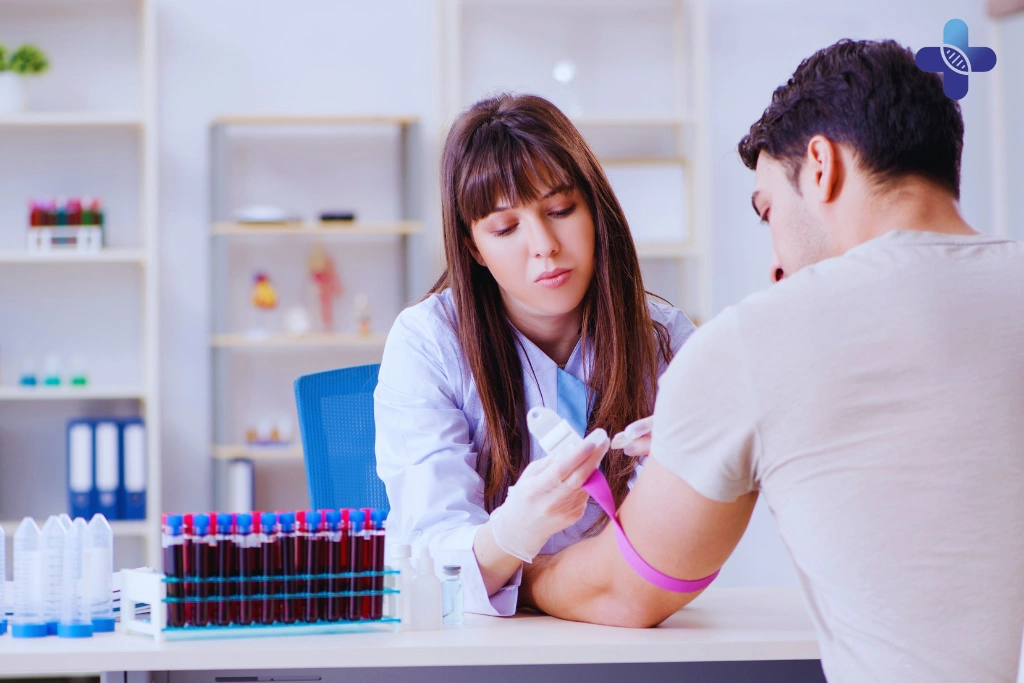When you’re in Bali, the last thing on your mind might be your health, especially when you’re enjoying the tropical paradise. However, delaying STD testing can have serious consequences that could affect your long-term well-being. Many sexually transmitted infections (STIs) don’t show immediate symptoms, and waiting to get tested can allow these infections to silently progress. In this article, we’ll discuss why you shouldn’t delay STD testing in Bali, the health risks associated with waiting, and how early detection can make all the difference. Taking action now can help you protect both your health and the health of those around you.

The Risks of Ignoring Symptoms: Why You Shouldn’t Delay STD Testing in Bali
When you visit Bali, you’re not just here for the sunshine and beaches, but for a life-changing experience. However, certain experiences can lead to unexpected health risks, like sexually transmitted diseases (STDs) in bali. Many people assume that if they don’t feel sick or haven’t noticed any symptoms, they are in the clear. This is a dangerous misconception, as many STDs are asymptomatic in their early stages. Delaying testing because you feel fine can give these infections time to spread, increasing the likelihood of complications down the road. Whether you’re on vacation or living in Bali long-term, taking your health seriously is the first step to enjoying everything the island has to offer without worry.
A little delay can cost your health, especially when it comes to STDs. Ignoring symptoms or avoiding testing only allows the infection to progress, often causing long-term consequences such as infertility, organ damage, or increased risk of spreading the infection to others. Early detection is key in preventing these outcomes. By getting tested regularly or after potential exposure, you can protect yourself and your partners. This simple action could save you from the physical, emotional, and social burdens that come with untreated STDs. Don’t wait for symptoms to worsen—act now and take charge of your health while in Bali.
Why People Delay STD Testing
For many people, the idea of getting tested for STDs comes with feelings of fear and embarrassment. The stigma surrounding sexual health often discourages individuals from seeking help, particularly when they fear judgment from medical professionals or peers. This emotional barrier can be especially strong for those who have recently engaged in sexual activity and may feel embarrassed about the possibility of an STD. Unfortunately, this fear prevents many from acting proactively, despite the fact that early detection can prevent much more severe health consequences down the road.
A common misconception that contributes to the delay in testing is the belief that if someone doesn’t feel sick, they must be fine. However, many STDs, including HIV, chlamydia, and gonorrhea, often do not show any symptoms in the early stages. This means that people can carry the infection without realizing it, unknowingly transmitting it to others. By the time symptoms appear, the infection may have already caused significant harm, such as damage to the reproductive system or the development of more serious complications. Without early intervention, these infections can lead to long-term health problems that are harder to treat.
Testing early is critical because it allows for timely treatment and minimizes the risk of complications. Many STDs can be treated effectively if caught early, reducing the chances of long-term health issues, such as infertility or chronic pain. Early testing also helps prevent the spread of infections to partners and reduces the emotional and social burden associated with untreated STDs. By seeking testing, you’re taking control of your health, ensuring that you don’t face a future of preventable issues. It’s important to remember that testing is a responsible and necessary step, not just for your own health, but for the well-being of others as well.

The Health Risks of Delayed Testing
Delaying STD testing can result in serious health risks that might otherwise be avoided with early detection. These risks are often progressive and can lead to long-term complications affecting not only your body but also your future health and relationships. Below, we dive deeper into the specific health concerns associated with delaying STD testing.
Complications from Untreated Gonorrhea
Gonorrhea in bali is a bacterial infection that can initially be asymptomatic or present with mild symptoms. However, if left untreated, gonorrhea can spread to other parts of the body and cause severe health problems. One of the most concerning complications of untreated gonorrhea is Pelvic Inflammatory Disease (PID) in women, which can lead to infertility, chronic pelvic pain, and ectopic pregnancies. In men, untreated gonorrhea can lead to epididymitis, an infection in the testicles that can also cause infertility. Additionally, gonorrhea can increase the risk of acquiring HIV.
Chlamydia and Its Long-Term Effects
Similar to gonorrhea, chlamydia in bali is often asymptomatic, which is why many individuals may unknowingly carry the infection. If left untreated, chlamydia can lead to PID in women, resulting in scarring of the fallopian tubes, which can make conception difficult or impossible. In men, it can cause urethritis, which is painful and affects the urinary tract. Chlamydia can also increase the risk of HIV infection, making early detection crucial.
Syphilis: A Silent But Dangerous Disease
Syphilis in bali is another STD that often starts with mild or no symptoms. However, if left untreated, it progresses through four stages: primary, secondary, latent, and tertiary. In its final stage, syphilis can cause severe damage to vital organs, including the heart, brain, and nerves, leading to life-threatening conditions such as heart disease, paralysis, and dementia. Early treatment with antibiotics can completely cure syphilis, but delays in testing and treatment can result in irreversible damage.
The Risk of Spreading Untreated STDs
One of the most significant dangers of delaying STD testing is the risk of unknowingly passing the infection to others. Many STDs are contagious, even when the infected person does not have symptoms. By waiting for symptoms to appear or avoiding testing altogether, individuals unknowingly spread infections to their sexual partners, resulting in a cycle of untreated infections that can cause complications for everyone involved.
Increased Risk of HIV Transmission
For individuals with untreated STDs, there is also a higher likelihood of contracting or transmitting HIV. Certain STDs, like gonorrhea and chlamydia, can cause inflammation and sores that increase the risk of HIV transmission during sexual contact. By testing early and receiving treatment, you can reduce the risk of developing other complications, including HIV.
Social and Emotional Consequences
Delaying STD testing often carries significant emotional consequences, primarily due to the stigma associated with STDs. This stigma can make individuals feel ashamed or embarrassed about seeking medical help, which can cause them to postpone testing. The longer someone delays, the more likely they are to feel anxiety or fear about what the test results may reveal. The internal struggle of facing the possibility of an infection can create a heavy emotional burden that only worsens as time goes on. This mental toll can lead to stress, depression, and feelings of isolation, as the individual may feel alone in dealing with the situation.
When people finally realize the gravity of their situation—often after the infection has progressed—they are often overwhelmed with guilt and regret. Many people reflect on how early intervention could have prevented the situation from worsening. This sense of guilt can lead to emotional distress and lower self-esteem, as individuals may feel as though they failed in taking care of their health. This emotional burden can become even heavier if they have unknowingly passed the infection onto others. The fear of judgment or disappointing loved ones can deepen feelings of shame and lead to a sense of personal failure.
The emotional strain of delaying testing can also affect relationships with partners, family, and friends. Unaddressed feelings of guilt or fear can create barriers in communication, especially with intimate partners. Couples may experience conflict, trust issues, or strained emotional connections as the untreated infection persists. By addressing the issue early through testing, individuals can alleviate this stress, regain control over their health, and restore harmony in their relationships. Testing early not only protects your physical health but also nurtures your emotional well-being and strengthens connections with others.
Early Testing = Early Treatment
Early testing is crucial because it allows for early treatment, which significantly reduces the risk of complications and long-term damage. Many STDs, such as chlamydia, gonorrhea, and syphilis, can be effectively treated with antibiotics or other medications if caught early. If these infections are left untreated, however, they can cause serious health issues, such as pelvic inflammatory disease, infertility, or organ damage. By taking the step to get tested early, individuals can prevent these complications and ensure they are on the path to a full recovery.
The benefits of early testing go beyond just preventing severe health consequences; it also leads to faster and more effective treatment. When infections are identified early, the treatment process is often simpler and shorter. For example, in the case of HIV, early detection and medication can significantly delay the progression of the disease, allowing individuals to lead healthy lives for many years. Delaying testing, on the other hand, can result in more complicated cases that require longer, more intensive treatments, and may have a greater impact on your overall health.
Another key benefit of early testing is that it prevents the spread of STDs to others. Many STDs are transmitted even in the absence of symptoms, so an individual who is unaware they have an infection may unknowingly pass it to a partner. Early testing and treatment reduce the risk of transmission, ensuring that individuals not only protect themselves but also safeguard the health of those they care about. Regular testing and early intervention help reduce the overall prevalence of STDs, promoting a healthier and safer community.

How to Access Confidential Testing in Bali
At Life Everyouth Bali, we prioritize your privacy and comfort when it comes to STD testing. Our clinic is dedicated to providing discreet and professional care, allowing you to address your health concerns without fear of judgment. Whether you’re a local resident or visiting Bali as a tourist, we offer a range of options that make it easy to get tested in a way that suits your lifestyle.
Convenient Clinic Visits
For those who prefer a visit to the clinic, Life Everyouth Bali offers a welcoming environment where you can get tested for a variety of STDs. Our clinic is equipped with modern facilities, ensuring that all tests are conducted efficiently and professionally. The staff is experienced in making the process as comfortable as possible, answering any questions you may have and walking you through each step of the testing procedure.
Pricing for our clinic visits starts with the Basic STD Test Package, which includes a doctor consultation and an Anti-HIV rapid test. For locals (with KITAS), this package is priced at IDR 800,000, and for non-locals, it costs IDR 1,040,000. This package is a great entry point for those looking to get tested quickly and discreetly.
Home Service for Added Privacy
If you value your privacy and prefer to take the test in the comfort of your own space, we also offer a home service. This option allows you to schedule an STD test at a time and location that suits you, without having to visit the clinic. Our professional medical staff will come to you, ensuring the same level of confidentiality and care as if you were visiting the clinic.
The Medium STD Test Package, which includes an Anti-HIV rapid test, Gonorrhoea test, Trichomonas test, and Candida test, is available for locals (with KITAS) at IDR 1,400,000 and for non-locals at IDR 1,820,000. This is a comprehensive option that provides a thorough screening for multiple STDs, all from the comfort of your home.
Booking Made Simple
Booking your appointment with Life Everyouth Bali is easy and straightforward. Whether you choose to visit the clinic or opt for home service, our team is here to guide you every step of the way. You can quickly book your appointment online or over the phone, and we will ensure your privacy and confidentiality throughout the entire process. For peace of mind and a seamless experience, Life Everyouth Bali is committed to offering professional, compassionate care for all your STD testing needs.
By offering both clinic visits and home service options, we ensure that everyone has access to the confidential, high-quality testing they need, without any inconvenience or discomfort. Take control of your health today with STD testing in Bali—ensure your peace of mind and protect both yourself and your partners.

Conclusion Why You Shouldn’t Delay STD Testing in Bali
In conclusion, delaying STD testing in Bali can have severe physical, emotional, and social consequences. Many STDs, including chlamydia, gonorrhea, and syphilis, often don’t show symptoms in the early stages, leading people to believe they are healthy. However, if left untreated, these infections can lead to long-term health complications, such as infertility, chronic pain, or even organ damage. Early testing is crucial in preventing these outcomes, allowing for timely treatment that can significantly reduce the risk of further harm and prevent the spread of infections to others. Whether you’re a tourist or a local, taking proactive steps to get tested can protect both your health and the health of those around you.
By choosing to test early, you not only avoid severe health risks but also reduce the emotional toll associated with untreated STDs. The stigma surrounding sexual health can discourage many from seeking help, but it’s important to remember that early testing and treatment can prevent unnecessary distress and damage. At Life Everyouth Bali, we make STD testing accessible and confidential, offering both clinic visits and home service options. With various affordable packages, including the Basic STD Test Package starting at IDR 800,000 for locals (with KITAS) and IDR 1,040,000 for non-locals, you can easily take charge of your health. Don’t wait for symptoms to worsen—get tested today and protect your well-being for tomorrow.
Frequently Asked Question Why You Shouldn’t Delay STD Testing in Bali
Why do people delay STD testing?
Many people delay STD testing due to fear of judgment, embarrassment, or the belief that they’re fine because they don’t feel sick. There is also a common misconception that if symptoms aren’t present, then there’s no reason to test. However, many STDs can be asymptomatic, especially in the early stages. This means that even if you feel healthy, you could still be carrying an infection. Delaying testing allows the infection to potentially worsen, leading to more serious health complications. Regular testing is a responsible way to stay informed about your sexual health and protect both yourself and your partners.
Is it dangerous to wait for symptoms before testing?
Yes, waiting for symptoms to appear before testing can be extremely risky. Many STDs, such as chlamydia, gonorrhea, and HIV, can cause damage to your body without showing any noticeable symptoms. In the case of untreated infections, you could experience long-term consequences such as infertility, organ damage, or even more severe conditions like cancer. Early testing ensures that these infections are detected and treated before they cause lasting damage, which is why it’s important to be proactive about your sexual health even if you’re not showing symptoms.
Can STD symptoms go away without treatment?
Some STD symptoms, such as pain, itching, or discharge, may temporarily subside without treatment, leading individuals to think the infection is gone. However, the infection can still be present and may continue to damage the body. For example, untreated gonorrhea or chlamydia can lead to pelvic inflammatory disease (PID), infertility, or chronic pain. Even if symptoms subside, it is still important to get tested and treated to avoid long-term complications and the risk of passing the infection on to others.
What if I test positive after delaying?
While it may be distressing to learn that you’ve tested positive for an STD, it’s important to remember that early detection still allows for effective treatment. The earlier an infection is diagnosed, the more easily it can be treated with antibiotics or antiviral medications. Delaying testing may result in more complicated treatments or more severe health problems, but it’s never too late to take control of your health. Medical professionals can help you create a treatment plan, manage symptoms, and provide the support needed to fully recover. The most important step is that you now know your status and can begin treatment immediately.
Can delaying a test affect my partner’s health?
Yes, delaying testing can have a direct impact on your partner’s health. Many STDs are contagious, even if there are no visible symptoms. If you delay testing and unknowingly carry an infection, you could transmit it to your partner, potentially leading to complications for them as well. Regular testing helps ensure that you protect both yourself and your partner from possible infections. It’s important to maintain open communication and encourage mutual responsibility for each other’s health through regular check-ups.
How long can I have an STD without knowing?
Some STDs can remain undetected for months or even years. Many infections, such as HIV, herpes, and chlamydia, can be present without showing any symptoms, making it difficult to know that you are infected. Without regular testing, these infections can silently progress and cause serious health problems later on. The only way to know for sure whether you have an STD is to get tested regularly. It’s crucial to make STD testing part of your routine, especially if you’ve had unprotected sex or multiple partners.
Is early testing more accurate?
Yes, early testing is more accurate because it detects infections before they have the chance to cause significant damage. Testing within the optimal window for each infection ensures that it is caught early, which can lead to a quicker, easier treatment process. For example, HIV can be detected sooner with early testing, allowing for a much more effective treatment regimen. Catching STDs early also reduces the chances of transmitting the infection to others, helping prevent outbreaks in your community. Regular and timely testing ensures that any infections are caught while they are still treatable.
What’s the worst-case scenario of delayed STD testing?
The worst-case scenario of delaying STD testing is the progression of the infection to more severe health problems. Untreated STDs can cause permanent damage to the body, such as infertility, organ failure, or even death. For example, untreated syphilis can progress to neurological and cardiovascular problems, and untreated chlamydia or gonorrhea can lead to pelvic inflammatory disease (PID) or infertility. Additionally, delaying testing can increase the risk of spreading the infection to others, leading to more complicated health issues within the community. Prompt testing and treatment are essential to avoid these worst-case scenarios.
Where can I get tested in Bali discreetly?
Life Everyouth Clinic offers confidential STD testing services in a safe, non-judgmental environment. Whether you prefer visiting the clinic or would like the added privacy of a home visit, we provide flexible testing options to suit your needs. Our medical professionals are dedicated to ensuring a comfortable and discreet experience. We understand the importance of privacy when it comes to sexual health, so we guarantee a safe and respectful testing process. You can easily schedule your test through our website or by contacting us directly for more information.
What if I feel fine but had a risky encounter?
Even if you feel perfectly fine, it’s still essential to get tested if you’ve had a risky encounter. Many STDs can remain asymptomatic for long periods, meaning you might not have any noticeable symptoms but could still be infected. It’s important not to wait for symptoms to appear before seeking testing. Testing after a risky encounter ensures that you catch any infections early, preventing future health complications and reducing the risk of transmitting the infection to others. It’s always better to be proactive and get tested, even if you feel healthy.
How much does STD testing cost in Bali?
The cost of STD testing in Bali can vary depending on the package and the clinic you choose. At Life Everyouth Bali, we offer a range of STD test packages designed to suit different needs and budgets. Our Basic STD Test Package starts at IDR 800,000 for locals (with KITAS) and IDR 1,040,000 for non-locals. For more comprehensive testing, our Premium STD Test Package is available for IDR 3,000,000 for locals (with KITAS) and IDR 3,900,000 for non-locals. Additionally, we offer home visits for added convenience, allowing you to get tested in the privacy of your own home. For a complete list of prices and packages, please visit our website or contact us for more information.
